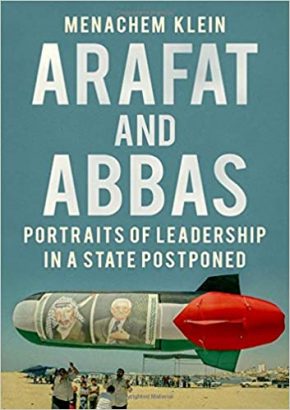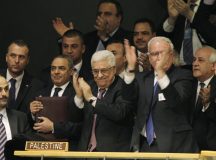The Palestinian national movement has been in disarray for a long time. The failings of its political leadership have been particularly exposed by the Benjamin Netanyahu-Donald Trump alliance, unable to respond to paradigmatic changes to the status quo. Menachem Klein’s Arafat and Abbas: Portraits of Political Leadership in a State Postponed is an introduction to the centrality of leadership in the Palestinian struggle, critically examining the complex legacy of Yasser Arafat alongside the managerial elements of his second-rate successor Mahmud Abbas, incumbent president of the Palestinian Authority (PA).
Klein argues that failures of political leadership (a quality not routinely found among the fighters and activists of the Palestine Liberation Organization/Fatah party) have perpetuated the statelessness of the Palestinian people. While he thinks the occupation, the lack of Arab unity (coupled with its withering support for the Palestinian cause), and the partisan engagement of the US have all posed challenges, it has been an internal challenge – this is a people without a leader – that has been the primary reason for continued statelessness.
Klein provides rich insights into the psychological makeup of his two principals, the personal inclinations that have contributed to their successes and their failures. Arafat, from a lower middle class family, was a survivor and a fighter, but also a deeply suspicious man, often theatrical and egotistical. Neither a team player nor a dictator, but rather captain and coach, he was nonetheless an iconic leader because he was the ‘consummate fighter who struggled until his death’.
Abbas has been his ‘antihero successor’. An ‘anti-icon Sisyphean president’, he disapproved of Arafat’s one-man-show style of leadership. While Arafat was at the helm, Abbas chose to keep a relatively low profile in the leadership movement, despite his obvious credentials — a PhD from Moscow and financial independence. Abbas did not like the drama and theatrical tricks of Arafat. Preferring a more business-like approach to leadership, he surrounded himself with technocrats and efficient professionals. In his private life, he is fond of elite society and high culture. Not much of a public figure, preferring a closed-door approach to making deals, he is considered an uninspiring leader, lacking the popular support enjoyed by Arafat. The tragedy of Abbas, Klein thinks, is that he ‘is destined to carry on a mission while his [personal] qualifications and international and domestic circumstances make this mission almost impossible to accomplish’.
Interestingly, Klein identifies a common trait shared by these two apparent opposites: ‘Neither Arafat not Abbas admitted mistakes and they also ended up in a similar situation at the end of the road. Each man enjoyed a short moment of glory and international support at the opening of his term. Later, under Israeli and Western physical and political siege, they were ultimately neglected and betrayed.’
Abbas has ruled largely via decrees, showing minimal respect for democratic processes or expressions of dissent within the Palestinian polity. Utterly incapable of self-correction, he has become a one-man show — ironic, given that he held this against Arafat. Assessing the political thinking of the two leaders, Klein observes that ‘over the years neither Arafat nor Abbas turned into a Western liberal or social democrat. Universal human rights or Western morality are not their points of departure nor the guidelines for their politics”.
Once upon a time, the Palestinian cause enjoyed significant international political support and solidarity. Much of the credit for this must go to Yasser Arafat, the guerrilla fighter who not only successfully forced the Palestine question onto the international agenda, but also decoupled it from the vested interests of the Arab world. But the rise of Hamas harmed the international solidarity that Arafat strived hard to create. Influential Asian states like India have found it difficult to ignore the religious radicalisation that Hamas espouses. Klein argues that the successes of the Palestinian movement were, to a significant degree, linked to the orientation of world politics in the period up to the end of Cold War. Global concern for the Palestinian cause, Klein suggests, was because ‘the romance of the Palestinian cause came from the abstract, idealistic messages of the revolution — justice, freedom, self-determination, a struggle against Israeli occupation, colonialism and Western imperialism, and the correction of an historical injustice [during the Cold War]’.
Political leadership plays an important role in both national movements and well-established nation-states. However, the topic is not studied with intellectual rigor in the political sciences, with leaders and their legacies remaining mostly the province of the biography and autobiography. One strength of this book is Klein’s first-hand knowledge of his principals; he closely followed Arafat and Abbas over 25 years, as a participant in official and unofficial rounds of Israel-Palestine peace talks.
That said, I hoped for something more from this book. Failures of leadership are, ultimately, indicative of a social crisis, not just a political crisis. It is societies that run out of good leaders. This poses the question of how societies cultivate creative and responsible political leaders — and, how they rid themselves of bad leaders. Klein elides these questions.




































